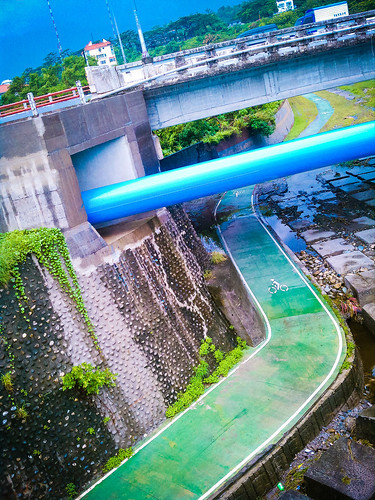[This is intended as a companion piece to this post about the kickoff of the 2010 Taiwan Cycling Festival]
Taiwan’s Ministry of Transportation and Communications (MOTC) are in the midst of expending a 4-year (2009 to 2012) US$25 million budget for the “Bicycle Network Demonstration of the Eastern Region” project.  These projects are designed, in the words of the MOTC, to:
[E]stablish a bicycle network in the eastern region and to implement the seamless integration of the railway-bicycle combination transits to connect scenic, recreational, ecological and cultural sites as part of the blueprint for the bicycle network in the eastern region.
To this end, the MOTC – in cooperation with other federal agencies and the local Hualien and Taitung governments – have already completed a number of cycling infrastructure improvements.

Bicycle Facilities Construction and Improvements
The MOTC have have aimed their efforts at making the Hualien-Taitung bicycle routes a “bicycle riding paradise.” Â In 2009, a total of 174 km of paths or on-road facilities were constructed or improved (including the introduction of of slow lanes within the provincial highway system to integrate bicycle lanes). Â This resulted in a regional of total of 578 km of networked roads that incorporated cycling facilities. Â According to the MOTC, 2010 Â will be 250 km of bicycle paths and, with assistance from local governments, another 89 km of on-road improvements. Â By the end of 2010, there should be a total 917 km of cycling facilities/improvements in the region. Â These include improvements on the existing routes of Provincial Highways No. 2, No. 9, No. 8, No. 9C, No. 7, No. 7C, and other minor connecting roads.
Bicycle Facilities Design Guidelines
To ensure that all this work results in a safe and useable bicycle network, the “Bicycle Path System Plan Reference Manual (2st Ed.)” has been completed, and is available here (in Mandarin).  In addition, a safety manual aimed at riders – the “Bicycle Riding Safety Manual” –  is available for download.  While I’ve been told that an English-language version of the linked site is forthcoming, I’m not sure that English-language editions of either of these publications are planned.
Hualien’s Bicycle-on-Bus Service
In 2009, Hualien implemented a bike-on-bus project, providing racks on the front of its municipal buses.  I’m unclear as to whether the rollout was limited to particular routes (I suspect it was). Â They appear to be your standard quick on/off racks found in many countries.
I’m unclear as to whether the rollout was limited to particular routes (I suspect it was). Â They appear to be your standard quick on/off racks found in many countries.
- Bicycle Carriage Transformation: Â The TRA plans for modifications of 45 cars of the Chu-Guang Express and 32 cars of the PP Tze-Chiang Express to transport people with bicycles. Â After modifications, each car will have bike racks and passenger seating. Â Some of the removed old units will be recycled into bicycle service stations. Â There are future plans for special train reservations for which bicycle enthusiasts may apply. Â The TRA has also announced that preliminary prices will entail reduced fares, with each bicycle receiving a 50% discount from the regular fair.

- Bicycle Depot Setup: Â The plan is to provide 16 bicycle depots along the eastern region with services such as bicycle rental, rest areas, restrooms, bicycle maintenance and cleaning, food courts and other resources. Â In conjunction with the “2010 Taiwan Bike Day” activities, the TRA set up 5 stations in Sincheng, Shoufong, Rueisuei, Yuli and Taitung. Â This brings the total to 8 stations currently in operation. Â One goal of these additional stations is to allow for one-way bicycle rentals.
- Station Access: the TRA plans to provide overpass and underpass walkways, with room enough on both sides to carry bicycles from the railcar to the station exit.
- Passenger Information: the TRA’s website will provide schedules and search systems for its railway-bicycle services.
As it stands, information about the status of these services is not available via the English language version of the TRA site (which leaves much to be desired, in general). I’d strongly advise calling them to book and confirm services well-ahead of time.
Public Information Efforts
The “MOTC Eastern Region Bicycle Information†website is intended to provide cycling enthusiasts traveling to the eastern region to check on traffic, travel and accommodation information.  I’ve found that – via the magic of Google Translate – the site is somewhat useable for English-language users.  I’ve been told that an English language version is forthcoming.  Also, for Mandarin-reading users of the Windows Mobile 6.1 platform, there’s a pretty nifty app providing all this info, available for download.  Or so I’m told.
Note: I always welcome corrections, but I welcome them especially so to this piece. Â The information above was based on my own observations, supplemented by information provided by the MOTC. Â Despite that, I’ve likely got a detail wrong or plans have already changed. Â If you have information that can help improve this piece, I’d quite appreciate it.
Bus Rack Photo credit: Ministry of Transportation and Communications

Richard Masoner
US$24M for a population of about 600,000 is a pretty nice shot in the arm for that region.
The link to the bike facility manual is just an announcement that it’s available for download. Here’s the actual PDF of the 2nd edition.
Richard Masoner
I’m reading that Taiwan design manual — they specify a dizzying 11 “types” of bike facilities. Type 1, for example, is a fully segregated bike only path, while Type 2 is the same thing except pedestrians are also allowed. Type 3 through 5 are what we call sidepaths here. Type 6-11 are bike lanes. There seems to be guidance on what type of facilities to place depending on traffic speeds; design notes for intersections, grates, stairs, signage; a chapter on bike parking. All in all it looks like good stuff.
MB
Thanks, Richard. I updated the link in the text.
I’ve been paging through it. Not surprised that the MUTCD was listed as a source, but Florida’s DOT? Oy. Also was hoping to see how they dealt with the leg-breaking gutter troughs, but it seems they’ve taken the economist’s approach, and just assumed a grate.